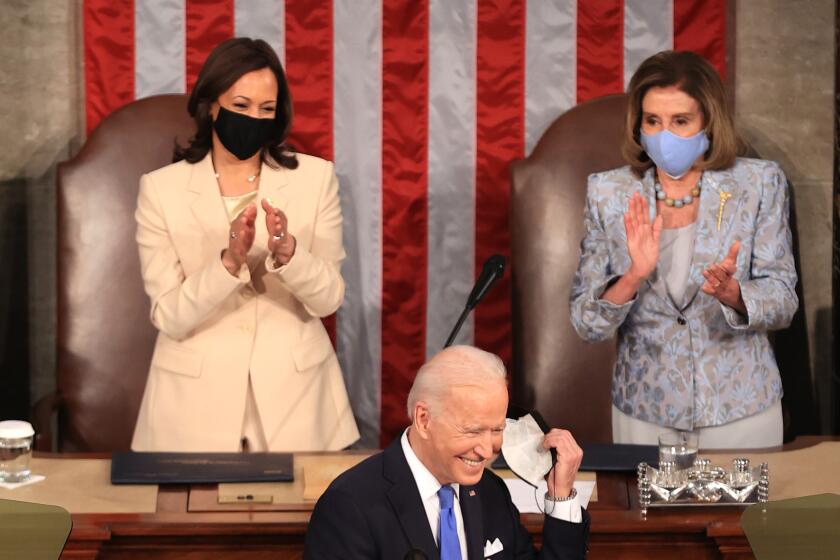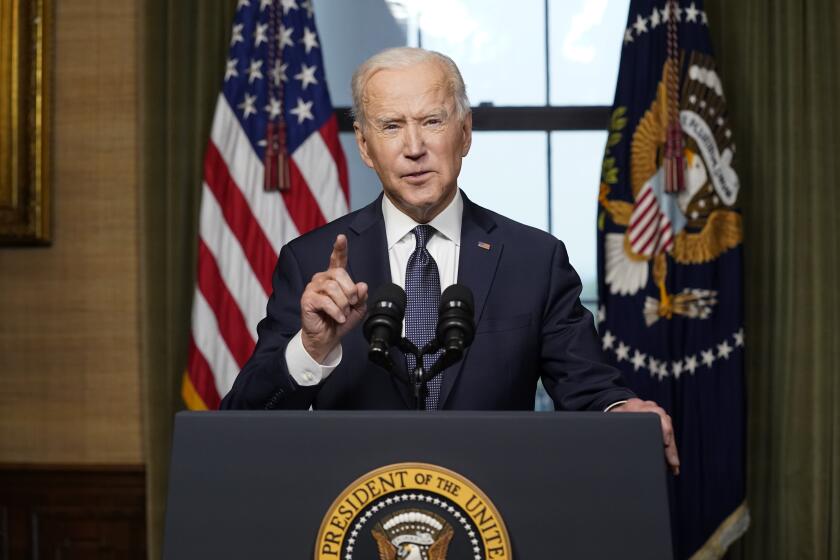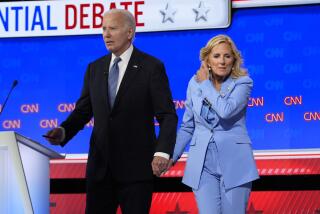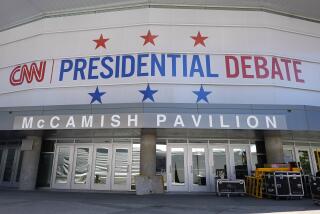News Analysis: President Biden’s speech to Congress offers a dose of left-leaning economic populism
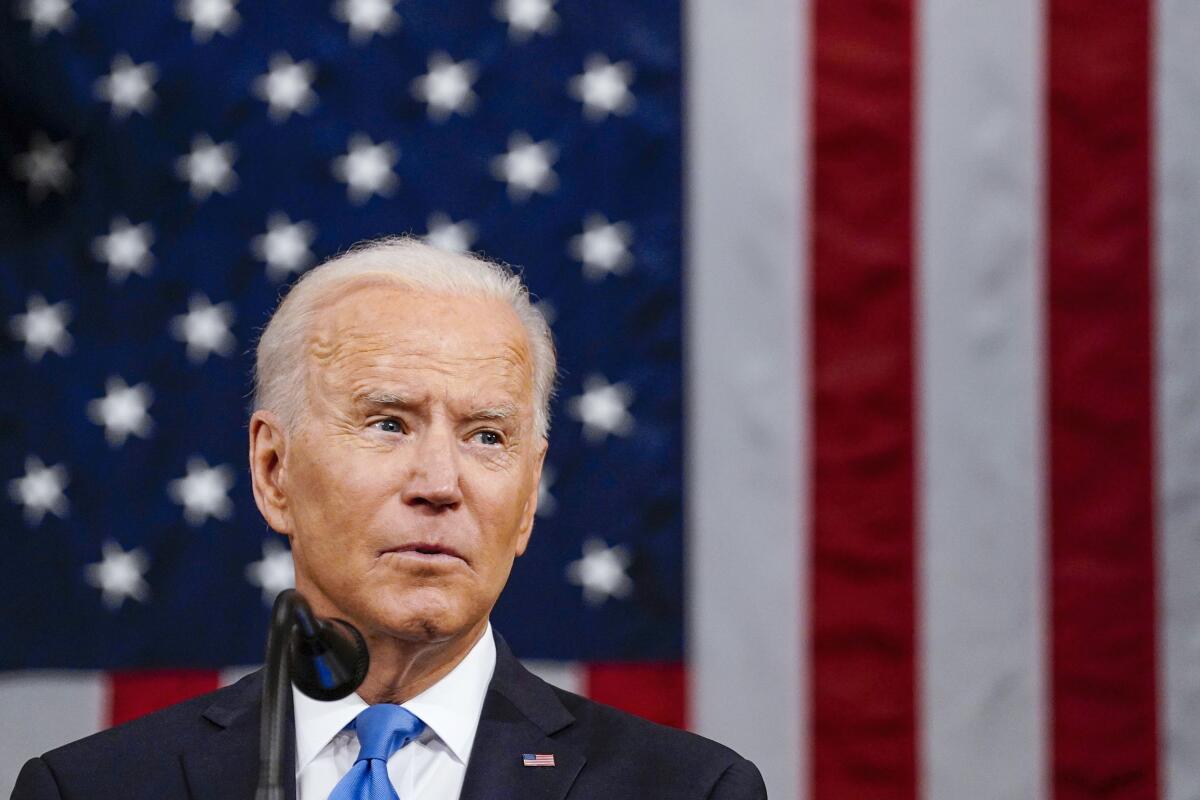
WASHINGTON — After four years of conservative populism focused on cultural grievances, President Biden’s first speech to a joint session of Congress delivered a dose of left-leaning economic populism on Wednesday, redoubling his wager that Democrats can build a lasting majority by using the power of government to deliver tangible benefits to working- and middle-class voters.
Instead of former President Trump’s denunciations of out-of-touch elites selling out American interests to foreigners, Biden demanded that the rich pay more taxes and proposed to use that money to provide benefits to families.
“It’s time for corporate America and the wealthiest 1% of Americans to just begin to pay their fair share — just their fair share,” he said.
Biden’s policies contrast with Trump’s on nearly every issue, but the language both presidents embraced — their emphasis on the fears and concerns of blue-collar Americans — shows how a populist approach to politics has taken hold in the aftermath of economic and political shocks that have hit the U.S. since the start of the century.
Biden addresses a joint session of Congress, pared down by pandemic precautions, in a prime-time appearance Wednesday to promote a bold domestic agenda.
That similarity reflects two realities that shape American politics:
For more than two decades, the rewards of economic growth have flowed disproportionately to more affluent Americans, widening the income gulf and slowing economic mobility.
And those more affluent Americans have become more highly partisan.
As a result, the voters up for grabs in U.S. elections tend to be blue-collar, and often hard-pressed.
In 2016, those swing voters were primarily white, non-college-educated residents of key states of the Industrial Belt. In 2020, Biden won back some of them, but Trump showed a strength among Latino voters that startled many Democrats. And it was non-college-educated Latinos who provided the biggest swing, according to analysis of voting data by Equis Research, a Democratic polling and strategy firm focused on Latinos.
Biden has proposed more than $4 trillion in new spending over the next decade in an effort to convince such voters that activist government can materially improve their lives. The lingering impact of the Great Recession combined with the immediate effects of the COVID-19 pandemic have changed the way Americans think about government, his advisors — and many outside experts — believe.
“Because of COVID, we’ve spent the last 14 months in relative lockdown” and Americans “see the world differently,” said Nadia Brown, a political scientist at Purdue University.
“Seeing [Amazon founder] Jeff Bezos make millions in a day while other people stand in line for food is making Americans rethink some things.”
The U.S. fails to collect nearly $1 trillion a year in owed taxes. Biden hopes recouping that money could help pay for his infrastructure plan.
Evidence suggests voters may be receptive to a pitch for activist government. A poll released this week by ABC News and the Washington Post found a roughly even division between those who favor a smaller government that provides fewer services and a larger one that does more. While that’s not a majority endorsement of big government, it was the lowest level of support for smaller government since the 1980s.
Biden’s speech, just over an hour long, covered many topics and, like State of the Union addresses of other presidents, at times became an exercise in checking off boxes for important constituencies.
But in its central part, Biden pitched his message to voters who may be receptive, but wary, about his expansive — and expensive — vision. He wanted to “speak directly,” he said, to Americans who “feel left behind and forgotten in an economy that’s rapidly changing.”
His economic plans, he said, would produce millions of jobs that “do not require a college degree.” He described his proposal to spend some $2.2 trillion over the next eight years to improve the nation’s infrastructure as “a blue-collar blueprint to build America.”
His proposals not only would make the economy more fair, they would increase growth by taking on problems that only government can, he said.
“Throughout our history, public investments and infrastructure have transformed America,” he said, citing the transcontinental railroad and interstate highways, the space race and scientific research that led to the internet and vaccines.
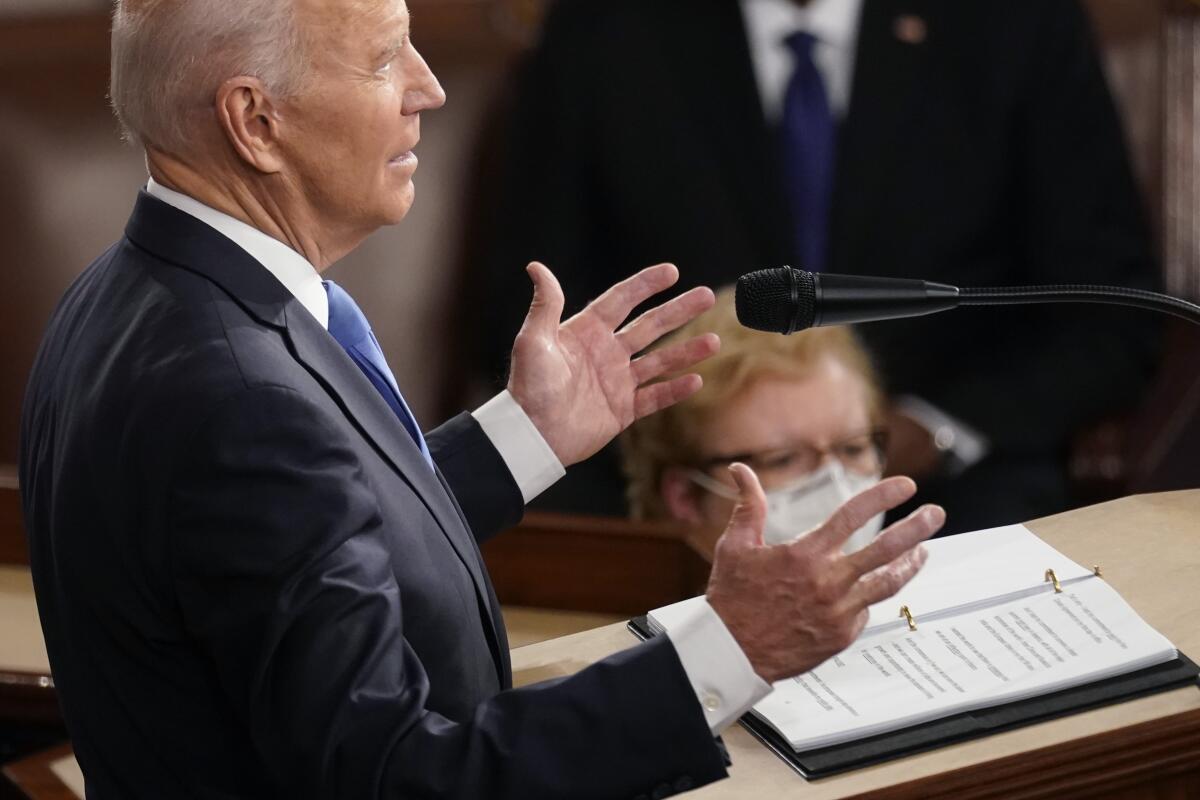
“These are the investments we made together, as one country — investments that only government was in position to make.”
“We the people are the government. ... It’s us,” he said.
Biden’s reference to Americans who feel forgotten echoed Trump’s pledge in his inaugural speech to govern on behalf of the “forgotten men and women of our country.”
They “will be forgotten no longer,” Trump said in 2017.
A few weeks later, in his first speech to a joint session of Congress, Trump made several pledges that would have sounded at home in Biden’s speech, including a call for a $1-trillion plan to ensure that “crumbling infrastructure will be replaced with new roads, bridges, tunnels, airports and railways gleaming across our beautiful land.”
Trump, of course, never followed through. His lack of interest in policy combined with his Republican congressional allies’ opposition to spending turned “infrastructure week” into a running joke during his administration.
Moreover, despite much talk about “economic anxiety” driving blue-collar voters toward Trump, research over the last four years has repeatedly shown that the factors that most strongly predicted a voter’s decision to cast a ballot for him involved attitudes toward race and immigration, not economics.
Throughout his tenure, Trump’s populism revolved around playing to those attitudes, not economics. His major economic policies skewed heavily toward the wealthy. That was especially true of his biggest legislative victory, the 2017 tax bill, which reduced rates for the wealthy and major corporations.
That bill never proved popular with voters and played a role in Republicans’ loss of their House majority a year later. Now, Biden has proposed reversing several of the measure’s major provisions, raising tax rates for large corporations and high-income Americans.
Beyond reversing policy specifics, Biden sought to reverse Trump’s assignment of blame for America’s problems. The previous president stridently blamed the nation’s political leadership as well as immigrants, saying they were responsible for undercutting wages and destabilizing American society.
Biden, in a far gentler manner, pointed the finger at the economic elite.
“I’m not looking to punish anybody,” he said. But he noted that during the pandemic, “650 billionaires in America saw their net worth increase by more than $1 trillion.”
“Fifty-five of the nation’s biggest corporations paid zero federal tax last year. Those 55 corporations made in excess of $40 billion in profit,” Biden said.
“That’s not right.”
By populist standards, the rhetoric was mild, but it drew a clear line.
Once before, in the aftermath of the Great Depression, similar rhetoric about the dangers of plutocracy helped cement a Democratic majority that endured for decades.
In his speech, Biden, who has put a portrait of President Franklin D. Roosevelt on prominent display in the Oval Office, made clear that he believes that formula can continue to work.
He’s betting his presidency on it.
More to Read
Get the L.A. Times Politics newsletter
Deeply reported insights into legislation, politics and policy from Sacramento, Washington and beyond. In your inbox three times per week.
You may occasionally receive promotional content from the Los Angeles Times.
